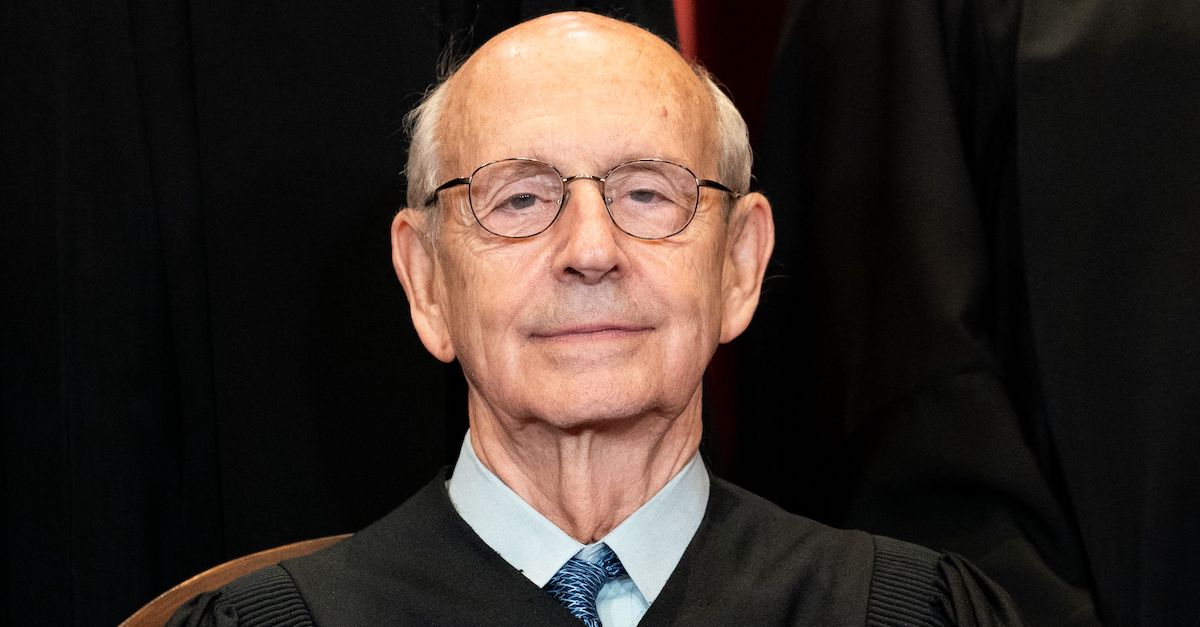
Associate Justice Stephen Breyer sits during a group photo of the Justices at the Supreme Court in Washington, D.C. on April 23, 2021.
The Supreme Court of the United States on Thursday released a retirement letter penned by Associate Justice Stephen Breyer. The Jan. 27 letter was foretold by a leak the day earlier that suggested Breyer would imminently step down from the nation’s highest court.
The letter does not name Joe Biden by name. It refers to him simply as “Mr. President,” and it commences the process by which a president must nominate and the senate must confirm a successor.
As to the timeline, Breyer was quite clear — yet nuanced — so as to apparently wish to avoid any bumpiness or political sluggishness with the installation of his successor.
“I intend this decision to take effect when the Court rises for the summer recess this year (typically late June or early July) assuming that by then my successor has been nominated and confirmed,” Breyer made clear. The letter therefore indicates that any stalled nomination process — such as what occurred during Barack Obama’s attempts to replace the late Antonin Scalia — would result in Breyer staying on the court.
Breyer wrote that he wished to “retire from regular active judicial service” and to “serve under the provisions of 28 U.S.C. § 371(b).”
That law allows Breyer to “retain the office” he holds but to “retire from regular active service after attaining the age and meeting the service requirements” laid out on a sliding scale elsewhere in the statute. Since Breyer has been on the bench continuously since Aug. 3, 1994, and is 83 years old, he easily meets those requirements and indeed far exceeds the minimum and maximum requirements which would have entitled him to a full retirement years ago.
The statute affords that Breyer “shall, during the remainder of his or her lifetime, continue to receive the salary of the office” he has held.
The “office” will effectively become a perfunctory title — once a Justice, always a Justice — as the law requires President Biden to “appoint, by and with the advice and consent of the Senate, a successor to a justice or judge who retires” pursuant to the statute.
Breyer’s letter area suggests he may choose to hear cases on a circuit court of appeals when called to sit by designation. Retired Justice David Souter has from time to time heard matters on the First Circuit Court of Appeals in Boston near his native New Hampshire and has indeed done so more than a decade after his retirement from the U.S. Supreme Court in June 2009.
Breyer briefly mentioned his terms of service — “nearly 14 years as a Court of Appeals Judge and nearly 28 years as a Member of the Supreme Court” — before noting that the work was both “challenging and meaningful.”
He also subdued any insinuations that the halls of justice may be filled with hostility and rancor during increasingly partisan times.
“My relations with each of my colleagues have been warm and friendly,” Breyer wrote. “Throughout, I have been aware of the great honor of participating as a judge in the effort to maintain our Constitution and the rule of law.”
Senate Majority Leader Chuck Schumer (D-N.Y.) has reportedly signaled that he wishes to move from nomination to confirmation in about 30 days — the process employed by Republicans for Justice Amy Coney Barrett after Justice Ruth Bader Ginsburg’s death in the waning days of the administration of Donald Trump.
On Thursday, President Biden repeated that he intends to nominate the first Black woman to the Supreme Court.
“I’ve made no decision except the one person I will nominate will e someone with extraordinary qualifications, character, experience and integrity,” he said. “And that person will be the first Black woman ever nominated to the United States Supreme Court. It’s long overdue.”
Read the full letter below: